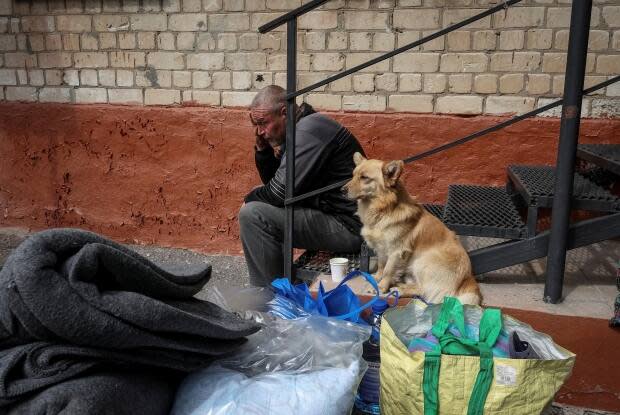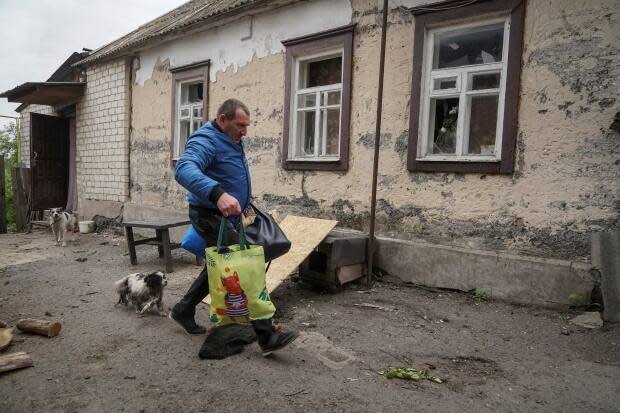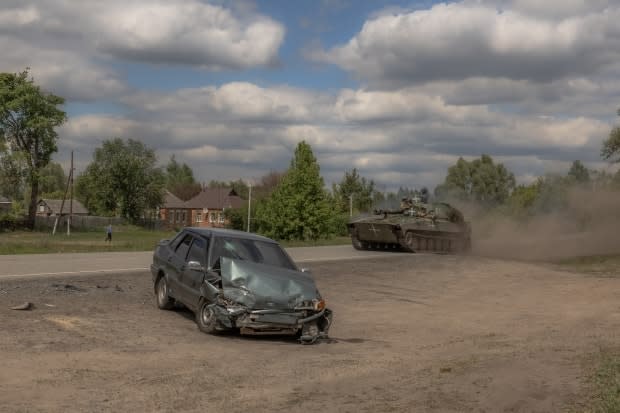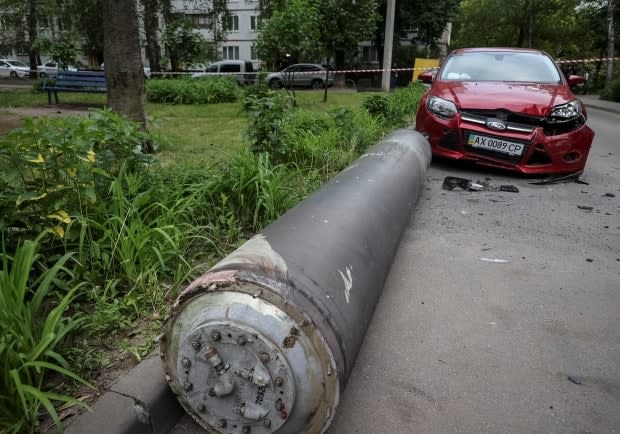Stepped-up Russian attacks on Kharkiv a problem that Kyiv cannot ignore

An intense, days-long campaign by Russia — including both ground assaults and airstrikes — has stepped up pressure on a border region in northeastern Ukraine that Kyiv cannot afford to ignore, given that it is home to the country's second-largest city of Kharkiv.
On Tuesday, Kharkiv Region Gov. Oleh Syniehubov said on national television that troops fought street to street on the outskirts of Vovchansk, a town located just a few kilometres from the Russian border that has been pounded by Russian attacks since Friday.
These combined recent events have forced Ukraine to rush reinforcements to the Kharkiv region, while local residents have scrambled to get out. Some 7,500 people have been evacuated from Vovchansk and nearby areas, according to Syniehubov.

Amid a third year of all-out war with Russia, Ukraine is having to manage multiple wartime challenges, including the defence of a front line stretching for hundreds of kilometres. Both analysts and Ukrainian officials say that Russia's pressure on Kharkiv could be ultimately aimed at splitting Kyiv's focus from other parts of that same front line.
"Kharkiv is not a primary objective [for Russia] in and of itself," said George Barros, the Russia team lead for the Institute for the Study of War think-tank. He assesses that Russia does not currently have enough troops in place to take control of the regional main city. Top Ukrainian officials have said the same.
Forcing Kyiv to spread its defences thinner could give Russian forces greater opportunity to move forward on other parts of the front line — such as in the Donetsk region, which Russian President Vladimir Putin has illegally annexed, though it is not fully controlled by his forces.
WATCH | Reinforcements for the Kharkiv region:
Invaded once already
The city of Kharkiv, the regional capital, previously endured a direct invasion effort at the start of Russia's all-out campaign against its neighbour.
"Now, we see that they again try to advance," Ukrainian lawmaker Oleksiy Goncharenko told CBC News, recounting the fact that Russian forces previously reached the outskirts of the city in 2022, but were later forced out.

This time around, however, the effort to oust the invading forces might be more difficult, owing to what Barros says are new Russian tactics — including the use of aircraft-launched glide bombs that Ukraine is not able to easily defend against from its side of the border.
"It is really hard," said Barros, who said the drone weaponry that Ukraine has developed is not applicable to stopping the incoming glide bombs, which are launched from Russian airspace and require sophisticated tools to intercept.
Barros believes some U.S.-provided weaponry could help Ukraine deal with this threat, but U.S. policy bars Kyiv from using such weapons inside Russian territory. He argues Washington should rethink that policy in wake of what is happening in Kharkiv.
On Tuesday, Ukrainian President Volodymyr Zelenskyy called for the urgent provision of two Patriot air defence systems to protect Kharkiv.
"The people are under attack: civilians, warriors, everybody. They're under Russian missiles," Zelenskyy said in Kyiv, alongside U.S. Secretary of State Antony Blinken, who made an unannounced visit to the Ukrainian capital on Tuesday.

Ongoing threats
Serhii Plokhy, a Harvard University historian who grew up in Ukraine, has written about the impact that the ongoing Russian aggression has had on Kharkiv — a city that a century ago was the capital of Soviet Ukraine.
In his 2023 book The Russo-Ukrainian War: The Return of History, he describes how Russia had sought to take control of the city of Kharkiv during the early days of the war, but also the toll its brutal attacks and "unrelenting bombardment" took on a city home to many Russian-speaking people.

"The bombardment of Kharkiv ... continued throughout March and April [of 2022], and well into May, with Russian artillery located closed enough to the city to target all parts of it," wrote Plokhy.
"By the end of April, close to 2,000 buildings had been either damaged or completed destroyed, and hundreds of citizens killed. But the city and its defenders withstood the assault."
Aside from all that early damage done by Russia, the war has continued to leave an imprint on the city of Kharkiv in various ways.
Like its downed TV tower, which was hit by a Russian missile three weeks ago. That attack interrupted the digital television signal, but it was reportedly restored within days.
Over the course of the war, Kharkiv has seen repeated Russian strikes on its critical infrastructure, but also on civilian buildings — including via drones and missiles. On Tuesday alone, Syniehubov, the Kharkiv region's governor, said Russia struck residential areas in the city seven times.
WATCH | An underground school built in wartime Kharkiv region:
There are also the hundreds of students who now attend a Kharkiv school with classrooms located six metres under the ground.
The fortified "bunker school" aims to protect students from the dangers of the war. So far, some 300 children have begun attending school at the facility, but the goal is for 900 to do so this fall.
"We need to make sure that both teachers and students get accustomed to the school," said Kharkiv Mayor Ihor Terekhov, who said he hopes several more schools of this type will be built in the city.
It's one more adjustment that people in Kharkiv have had to make, as they live with the uncertainty of what the war will bring them next.
"Whatever happens, life goes on," said Marina Prikhodko, a parent of two children, told Reuters when asked about the latest Russian advance that targeted Kharkiv.
"We have to try and live here and now, every day."


